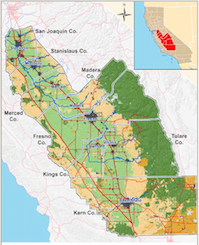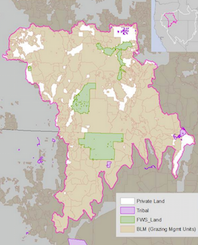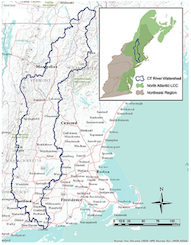|
What is a Landscape Conservation Design?
Landscape conservation design (LCD) is a collaborative, inter-disciplinary planning process that integrates societal values and multi-sector interests with the best available social and natural sciences to assess vulnerabilities, risks, and opportunities; and develops coordinated, spatially-explicit strategies that reduce land-use conflicts, enhance the adaptive capacity of the socio-ecological system, and maintains ecosystem function across the landscape for future generations (from Campellone et al. in review).
How are LCDs Developed?
An LCD process typically begins by identifying common priorities and focal resources, then assesses vulnerabilities of these to current and future stressors. Conservation strategies and actions are developed to address vulnerabilities, including where to focus efforts and who can contribute to those actions. Maps and spatial data are assembled for use as a common framework for decision-making and implementation.
Why are LCDs needed?
The ability to conserve resilient and adaptable ecosystems is a significant challenge considering stressors like climate change, land use change, and invasive species. These challenges cannot be addressed by a single agency or organization but require that we look beyond our organizational boundaries and work more collaboratively to achieve a shared conservation vision across the landscape. The Landscape Conservation Cooperative Network is committed to encouraging partnerships and supporting the landscape-scale approach to conservation. See the LCC Network's "Characteristics of LCC Landscape Conservation Designs".
|
Landscape Conservation Designs help us to:
- Develop a common understanding of how climate change and other stressors will affect the region;
- Encourage collaboration and develop a community of practice;
- Create science-based, spatially-explicit information that supports coordinated conservation action;
- Work together toward connected, functioning ecosystems that continue to provide important ecological services into the future.
|





